Origins
Founding Treaty

Meet the Signatories
BELGIUM
M. Paul-Henri Spaak
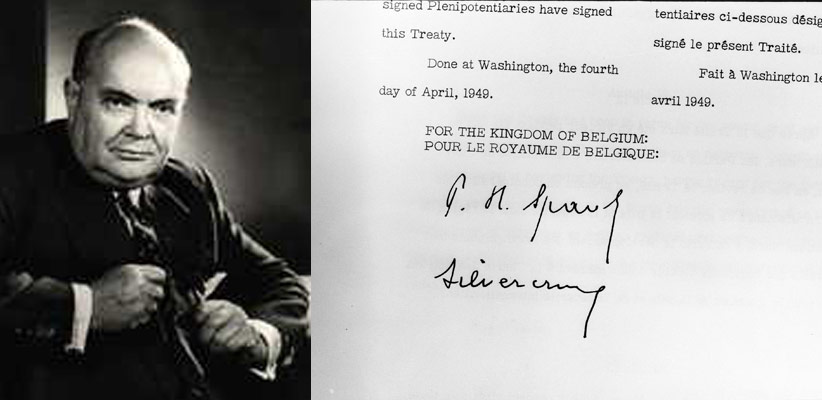
Paul-Henri Spaak was a prominent Belgian politician, highly influential in European politics, who left a huge legacy. He presided over the first General Assembly of the United Nations in 1945 and was one of the founding fathers of the European Union, playing a key role in the creation of the 1957 Treaty of Rome. Spaak was nicknamed “Mr Europe” and was awarded the Karlspreis – the award given by the German city of Aachen to those who contribute to the European idea and European peace. NATO Secretary General from 1957 to 1961, Spaak was instrumental in the choice of Brussels as the new location for NATO’s headquarters in 1966. He was also an exceptional orator and a prolific writer.
The new pact is purely defensive, it is directed against no one, it threatens no one; it should therefore disturb no one, save, of course, any person or persons who might foster the criminal idea of having recourse to war.
CANADA
Mr Lester B. Pearson
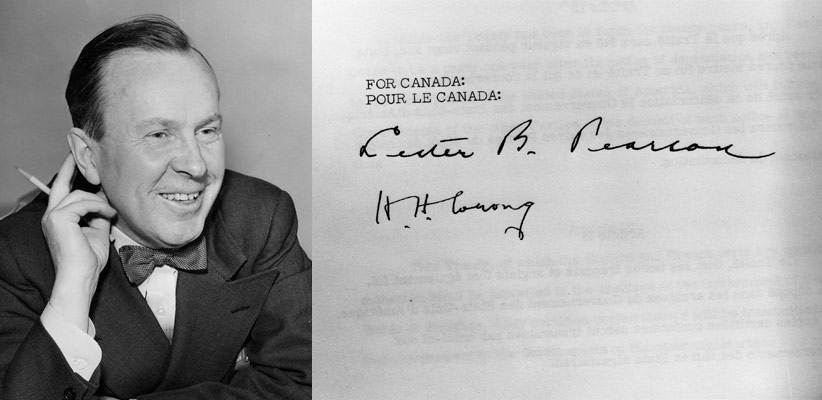
With a long list of accomplishments as Canadian Prime Minister and an international diplomat, Lester B. Pearson was a pioneer who helped shape world politics. He played a key role in drafting NATO’s founding treaty and received the Nobel Peace Prize in 1957 for helping to resolve the Suez Crisis. He is considered the father of the modern concept of peacekeeping and was also one of the “Three Wise Men” who drafted the report on non-military cooperation in NATO, which stressed the importance of political consultation between Allies.
This Treaty, though born of fear and frustration, must, however, lead to positive social, economic and political achievements if it is to live; achievements which will extend beyond the time of emergency which gave it birth, or the geographical area which it now includes.
DENMARK
Mr Gustav Rasmussen
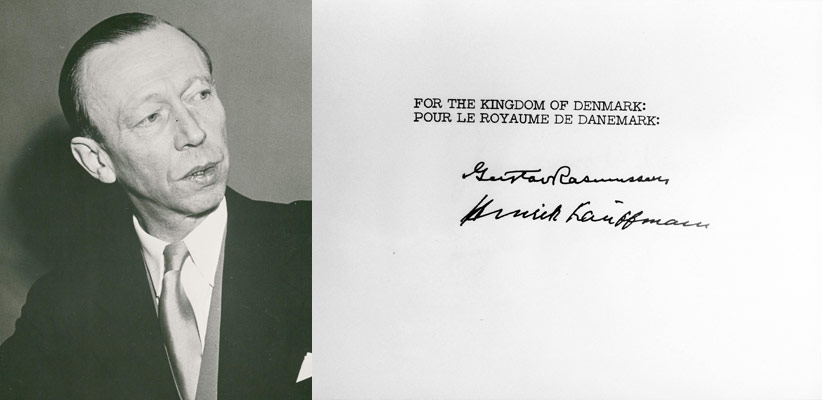
Gustav Rasmussen was a recognised expert in international law before becoming a career diplomat in the Danish Foreign Service. He had a cautious approach to foreign policy and, initially, was an apprehensive signatory to the NATO Treaty. The main drive behind Denmark’s role as a founding member came from the Prime Minister, Hans Hedtoft. Rasmussen respected the opinion of the Prime Minister and, as Foreign Minister, signed his name to the Treaty on 4 April 1949.
Under article 1 of the treaty, the parties undertake to settle any international dispute by peaceful means. (...) behind this pledge stand the character and policies of the countries which are parties to the treaty. The very nature of their institutions makes the calculated plan of aggression a virtual impossibility.
FRANCE
M. Robert Schuman
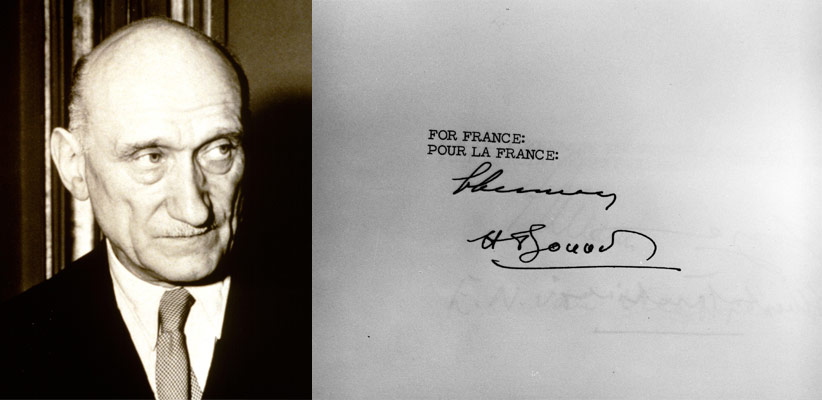
Robert Schuman is considered to be the “Father of Europe” and the architect of European institutions. Believing in European unity and increased cooperation, he was a key negotiator in a number of treaties and initiatives including the Council of Europe, the Marshall Plan and the North Atlantic Treaty. He is best known for the Schuman Declaration, published on 9 May 1950, the date now considered to be the birth of the European Union. Schuman was a French politician who held the posts of prime minister twice, minister of finance and foreign minister. He was also President of the then European Parliament (1958 – 1960) and was awarded the Karlspreis – the award given by the German city of Aachen to those who contribute to the European idea and European peace.
Nations are more and more convinced that their fates are closely bound together, that their salvation and their welfare can no longer be based upon an egotistical and aggressive nationalism, but must rest upon the progressive application of human solidarity.
ICELAND
Mr Bjarni Benediktsson
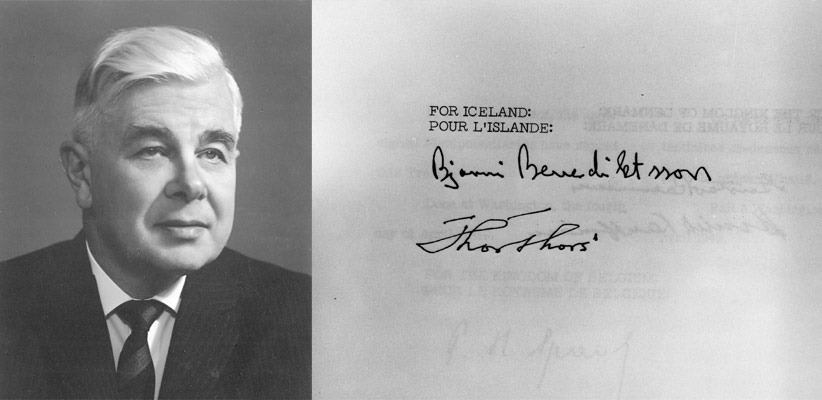
Bjarni Benediktsson was a professor at the University of Iceland and mayor of Reykjavik at a very young age. He spent most of his career in Icelandic politics and held the post of foreign minister from 1947 to 1953. He was therefore the person who signed the North Atlantic Treaty establishing Iceland as a founding member of the Alliance. He served as Prime Minister from 1963 to 1970 until his death, which was caused by a fire at the government summer residence in south-western Iceland. His wife and grandson also perished in the blaze.
It is a fact (...) that we are unlike each other in many respects, but there are many things which bind us solidly together … We all believe in friendly cooperation among nations. We all want peace for all the world and well-being for mankind.
ITALY
Count Carlo Sforza
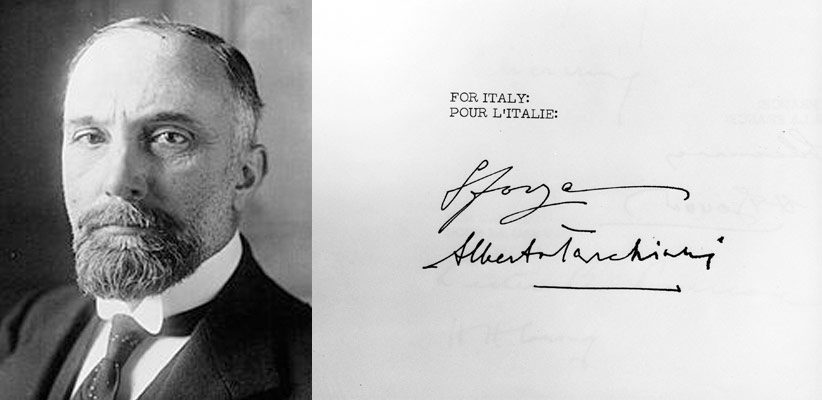
Count Carlo Sforza was an Italian diplomat and staunch anti-Fascist politician. He served abroad as a diplomat until he resigned, refusing to serve under Benito Mussolini. He took exile in Belgium, France, England and the United States before returning to Italy in 1943 where he started a political career. As Foreign Minister from 1947 to 1951, he advocated for a pro-European policy and ensured that Italy was a founding member of both NATO and the European Coal and Steel Community. The Count was also instrumental in ensuring that Italy joined the Organisation for European Economic Co-operation and is generally considered to be one of the designers of Italy’s pro-European policy.
The North Atlantic Pact will constitute one among the noblest and most generous events in human history if all its members will show (...) that the melancholy history of Europe has taught them this supreme lesson: that no Nation in the world can feel secure in its prosperity and peace if all its neighbors are not as safely marching towards the same goals of prosperity and security.
LUXEMBOURG
M. Joseph Bech
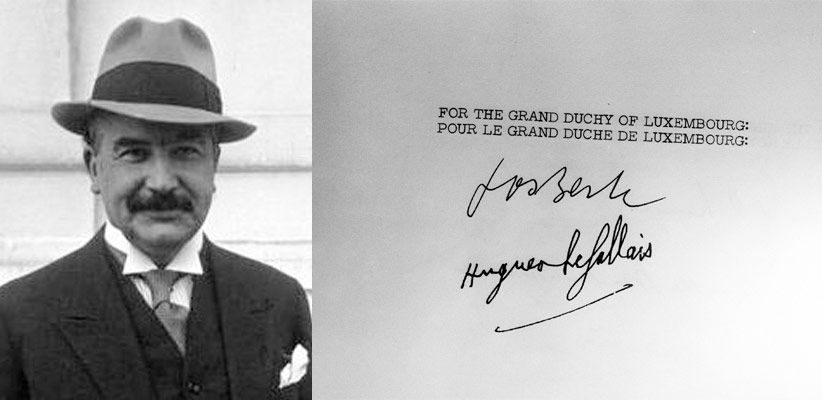
Serving as Prime Minister of Luxembourg and Minister of Foreign Affairs for significant periods of time during his career, Joseph Bech understood that internationalism and cooperation between states was crucial to the stability and prosperity of Europe. He helped to set up the Benelux union between Belgium, the Netherlands and Luxembourg, and is considered to be one of the founding fathers of the European Community. Bech was awarded the Karlspreis in recognition for his contribution to the unity of Europe and represented Luxembourg in all multilateral negotiations during and after the Second World War including Benelux (1944), the United Nations (1946) and NATO (1949).
… the states signatory to the Atlantic Pact constitute at once the most formidable and the most sincerely peaceful coalition of material and moral forces that has ever been set up by nations to ensure their security and to spare the world the horrors of war.
THE NETHERLANDS
Dr Dirk U. Stikker
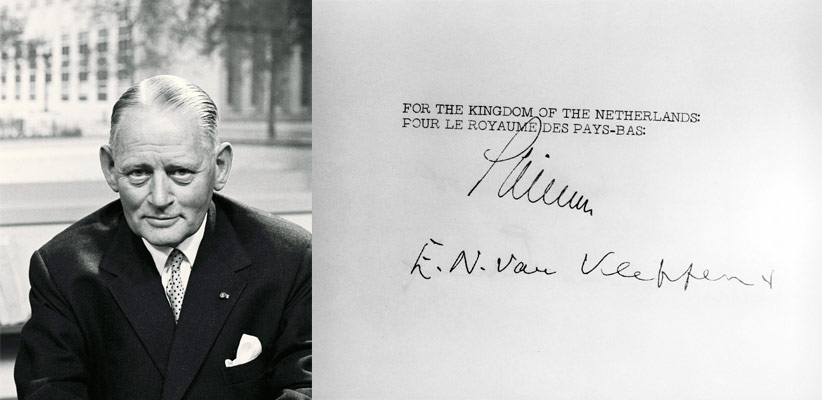
Dirk U. Stikker was a Dutch banker and industrialist before getting into politics. He was also director of Heineken International from 1935 to 1948, a function he left to become Foreign Minister. During his tenure, the Netherlands played an important role in the creation of NATO and the European Coal and Steel Community. Stikker was appointed Permanent Representative of the Netherlands to the North Atlantic Council and to the Organisation for European Economic Co-operation in July 1958, before being selected as the third Secretary General of NATO in 1961. He held the post until 1964 when health problems forced him to resign.
We rejoice at the thought that at last the truth prevails that the North Atlantic is a highway that unites, not a barrier that divides. We rejoice at the thought that North Americans and Western Europeans have found each other in a common edifice dedicated to peace.
NORWAY
Mr Halvard M. Lange
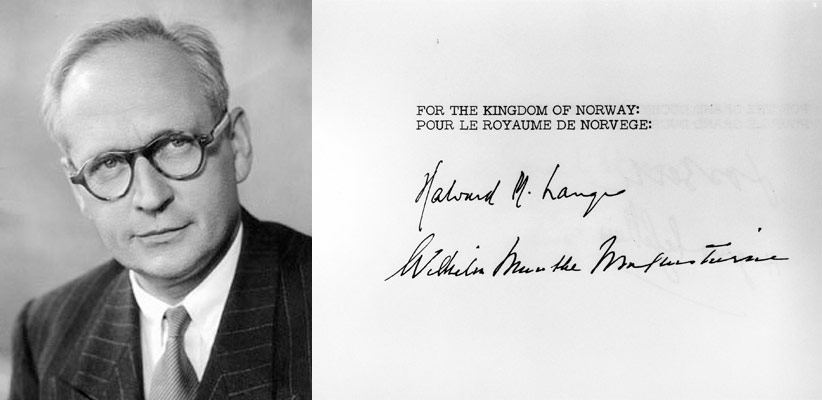
Halvard Lange was a Norwegian statesman and one of “Three Wise Men” who drafted the report to advise NATO on strengthening non-military cooperation and reinforcing political consultation between its members. In 1942, while Norway was under Nazi occupation, Lange was arrested and spent the rest of the war being moved from one concentration camp to another. Once the war was over, Lange held the post of Foreign Minister from 1946 to 1965 – with a short break in 1963. He was a member of the Norwegian Labour Party and was considered to be a right-wing politician because of his support for Western alignment. His father was Christian Lous Lange, an expert in internationalism theory and a Nobel Peace Prize winner.
Our pact is a pact of peace. It is directed against no nation. It is directed solely against aggression itself.
PORTUGAL
Dr José Caeiro da Matta
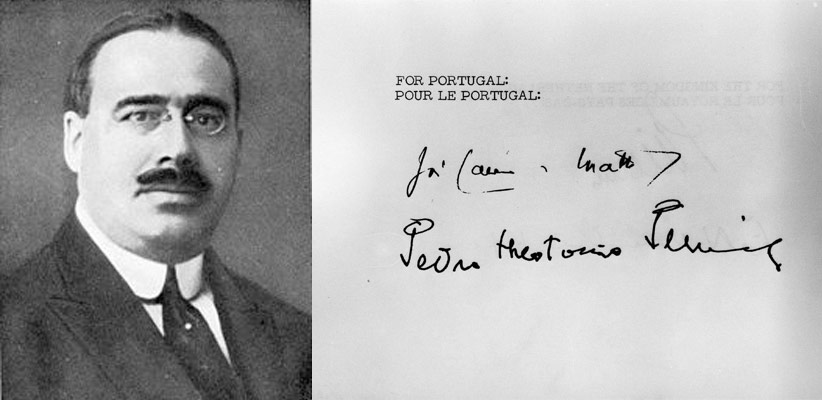
Dr José Caeiro da Matta had a long and distinguished career as a Portuguese lawyer and statesman. After representing Portugal in The Hague at the International Court of Justice from 1931 to 1945, he was appointed Minister of Foreign Affairs from 1933 to 1935. Proving to be a skilled diplomat, he represented Portugal at various international conferences and negotiations including the 1946 post-war talks in Geneva and the 1947 Paris Conference on the Marshall Plan.
Portugal wishes to assert that she sees in the North Atlantic Pact, not only an instrument of defense and international cooperation, but also, for the reasons and for the aims which govern it, a precious instrument for peace.
THE UNITED KINGDOM
Mr Ernest Bevin
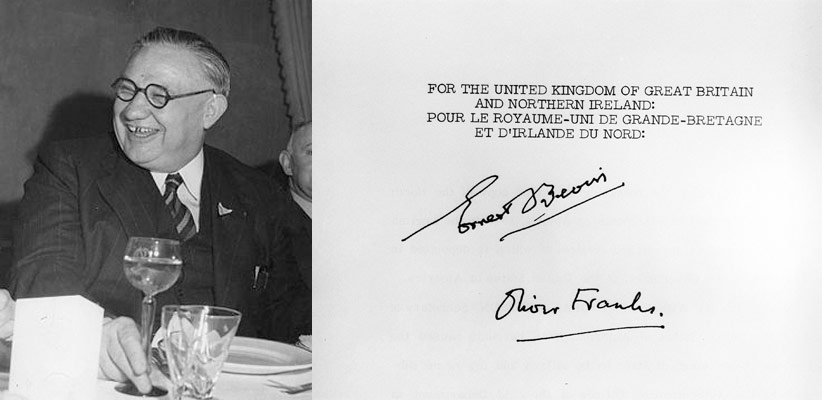
Ernest Bevin was a skilled orator and a former trade unionist who became one of the British Labour Party’s most prominent leaders. He was the main drive behind the creation of NATO. British Foreign Secretary from 1945 to 1951, a staunch anti-Communist and a critic of the Soviet Union, he was committed to bringing Western Europe together in a military alliance. He was eager to sign the Brussels Pact in 1948, opening the way for the formation of NATO in 1949. Bevin attended the first formative meetings of the North Atlantic Council.
Our peoples do not glorify war, but they will not shrink from it if aggression is threatened.
THE UNITED STATES OF AMERICA
Mr Dean Acheson
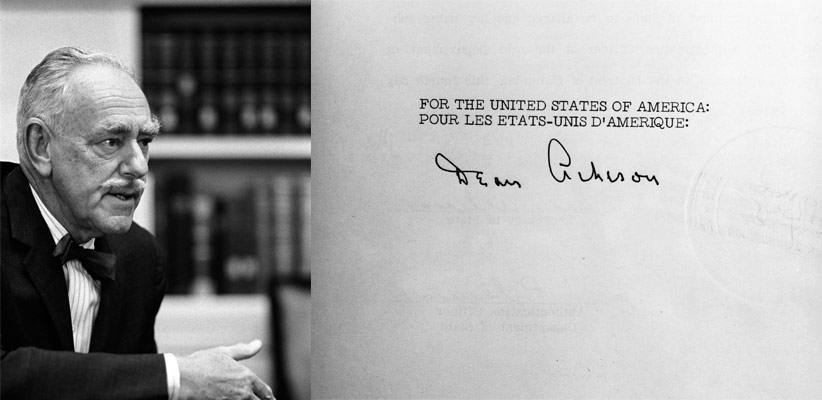
Dean Acheson was a prominent influence in the development of American foreign policy during the Cold War. He supported the principles of containment, helped to design the Marshall Plan and the Truman Doctrine, convinced US President Truman to intervene in the Korean War, and was consulted by President Kennedy during the Cuban Missile Crisis. His support for the creation of NATO marked a significant departure from the previous American policy of avoiding “entangling alliances”. As Secretary of State from 1949 to 1953, he attended and chaired the first meetings of the North Atlantic Council.
The reality lies not in the common pursuit of a material goal or of a power to dominate others. It lies in the affirmation of moral and spiritual values which govern the kind of life they propose to lead and which they propose to defend, by all possible means, should that necessity be thrust upon them.
